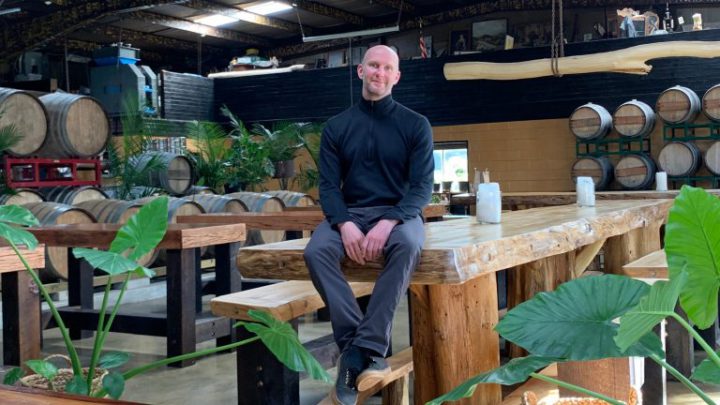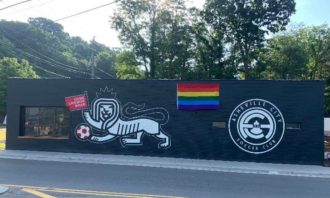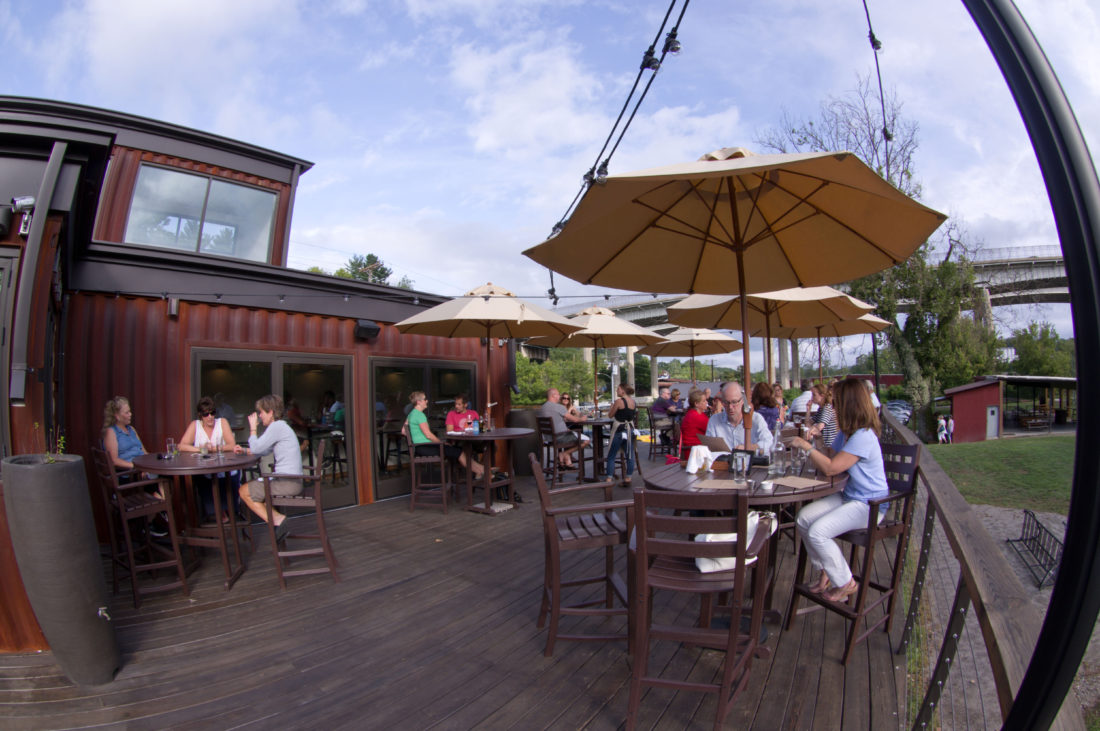The Smoky Park Supper Club boasts a front-row view of the French Broad River, a menu of wood-fired, farm-to-table cuisine — and as of July 8, far fewer tourists than other Asheville restaurants. Following its recent conversion into a private, members-only club, only North Carolina residents and their invited guests are permitted to dine at the River Arts District eatery.
Smoky Park General Manager and co-owner Kristie Quinn acknowledges that the move voluntarily excludes a sizable percentage of her former customers: Since the restaurant’s opening in 2015, she estimates, about 40% of its clientele has been tourists. But she says the new membership-based model prioritizes local community and helps staff, operating at reduced levels due to the COVID-19 pandemic, better serve repeat customers.
“It allows us to provide a higher level of service. Both of our businesses are very relationship-based, and we host so many people as regulars, but also with birthday parties, engagements, weddings,” says Quinn, who also owns 5 Walnut Wine Bar in downtown Asheville. “It’s hard when you see those people and you can’t take care of them because you don’t have a spot.”
The policy has raised eyebrows both inside and outside the service industry. Comments on Smoky Park’s Instagram and Facebook pages mostly support the decision, but many out-of-state patrons and even some locals have pledged to no longer support the business. And the move flies against the marketing of Explore Asheville, which manages the occupancy tax collected by the Buncombe County Tourism Development Authority and describes Asheville as “one of the most welcoming, vibrant cities in America.”
In the club
While Smoky Park’s policy may discriminate based on where someone lives, says attorney Derek Allen of the Asheville-based firm Allen Stahl + Kilbourne, it follows established state laws for private clubs. “It is perfectly legal to have requirements for membership to a club, provided that the requirements do not discriminate based on any characteristics that are part of a ‘protected class,’” he explains. “Examples of protected classes include race, color, creed, religion, national origin, sex and disability.”
Other membership-based entities such as country clubs, Allen continues, do employ residency requirements. But to Quinn’s knowledge, Smoky Park is the first restaurant to enact such a policy in North Carolina.

Quinn emphasizes that the restaurant has long focused on local community, noting how Smoky Park has opened its outdoor space to The Magnetic Theatre, yoga teachers and the Shelter Dog Transport Alliance. But she says the decision to adopt a membership model was also influenced by multiple negative interactions with tourists, which she claims prevented her staffers from providing the best experiences they could for other patrons.
“If someone comes in and they are not your neighbor, and they don’t feel compelled to be part of the neighborhood, sometimes the behavior is not the best. We had that behavior,” Quinn says. “We want to have a business that we’re proud of and where everyone wants to work together and enjoy what they do. If you come to work every day and people feel like they have the ability to abuse you, I can’t get behind that.”
Some in Asheville’s hospitality industry are wary of placing the blame for staff abuse squarely on the shoulders of nonlocals. “I think it’s a big mistake to target our visitors with being the bad guys,” says Executive Director Jane Anderson of the Asheville Independent Restaurant Association, which represents over 130 locally owned eateries.
Anderson suggests that North Carolina’s COVID-19 policies, which she says were stricter than those of neighboring states, led both locals and tourists to act out against service workers. “People trying to enforce the governor’s guidelines put up with a lot of baloney. Can we say they were all from out of state? Absolutely not,” she says. “North Carolina doesn’t have the market cornered on being kind and decent and treating others with respect. People here are people, too.”
Regarding Smoky Park specifically, Anderson doesn’t see the restaurant’s approach as heralding a larger turn away from tourists. “[Smoky Park] has a right to do what they see fit to do. I think they are also addressing the challenge of limited capacity due to the fact that our restaurants can’t hire the amount of staff that we need,” she says.
Under the radar
When asked if tourism leaders have concerns about Smoky Park’s policy or are aware of other businesses taking a locals-only stance, Explore Asheville spokesperson Kathi Petersen says she has “not heard from other local businesses concerned about or limiting their services to only certain guests. Explore Asheville and the BCTDA respect the rights of business owners to make decisions they feel are important to their success and within their own unique circumstances.”

But while Smoky Park may be the only area restaurant to explicitly bar out-of-state residents, other Asheville establishments are positioning themselves as locally focused in more subtle ways. “We purposely don’t have a website and don’t have a phone,” says Amber Arthur, owner of Olde London Road. The soccer bar, previously located downtown, also moved to the River Arts District during the COVID-19 pandemic to better serve locals.
At least 90% of the pub’s business is local, Arthur says, and the results of that patron mix have been positive. “Everyone who comes in here knows each other. As staff, you get to know your customers, know their names and what they like to drink. The business and employees are making almost 100% more [revenue] than when we were downtown,” she says. “We have a more consistent clientele, are busier Tuesday to Thursday, and locals tip infinitely better than tourists.”
Like Smoky Park, Olde London Road operates as a private club, but tourists from out of state are permitted to buy memberships. However, some strategic policies keep local access at the forefront. For the bar’s biggest events, like July’s Euro 2020 soccer tournament watch parties, $5 advance tickets must be bought in person (with ticket revenues donated to local nonprofits).
“We’re not hating on tourists,” Arthur says, adding that visitors who do make their way to the space to watch games are often excited to find an authentic soccer bar. But as a private club, the bar can ask tourists to leave to preserve the experience for other patrons.“If a big group comes in that might cause a ruckus, we just let them know it’s a private bar [and restrict entry]. We like to keep the vibe the way it is,” she says.
And Brouwerïj Cursus Kĕmē is hidden from tourists, literally, behind a nondescript, vine-covered gate. Visitors won’t even find a sign directing them around the gate to the brewery’s Thompson Street location, which reopens for on-site service Friday, Aug. 6. Jeff Horner, owner and brewer, says that’s all part of the plan.
“We’re an organically grown business trying to build community. Part of that is having a strong, loyal following with folks that live around the brewery,” Horner says. The taproom, which opened in 2018, does attract some persistent tourists, but Horner prioritizes relationship-building with local customers.
Cursus Kĕmē’s clandestine location and word-of-mouth marketing may restrict revenue — the BCTDA notes that 4.2 million visitors spent $2.2 billion at local businesses in 2019 — but Horner claims there are other benefits. “I didn’t start this project to flip it and see it go through the roof. My kids play down here every day. It’s a family affair and experience for the locals,” he explains. “They know when they come down to Cursus, they’re not going to be sitting between two bridesmaids’ parties. It’s rewarding for me personally that our patrons are our friends. My employees feel the same way.”
Editor’s note: This story was updated on Aug. 4; Kathi Petersen’s last name is misspelled in the print version.




It’s great that local business is putting a priority of keeping patron safe!!!!
While there are certainly some local residents that behave badly, the majority of locals welcome places not overrun with drunk, maskless tourists. Look around at the Florida tags everywhere and then check which state has a quarter of the Covid cases in the whole country. The city and county leaders apparently have no concerns.
North Carolina residents only? What, Asheville doesn’t get tourists from other part of NC?
So, someone from down the road in Greenville, SC would be considered a tourist and not allowed in the private club, but someone from Wilmington or Raleigh won’t be considered a tourist and will not be considered a tourist and be allowed?
How ELITIST is THIS ??? A private supper club ? Sounds very exclusionary and NOT a good fit for this town.